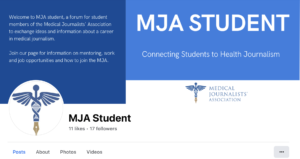
MJA student representative: Jess Beresford
Nurturing talent is essential to ensure that excellence in health and medical journalism not only survives, but thrives — so the MJA now has a student representative advising the executive committee on our membership offering to aspiring health and medical journalists who are still in education.
Jessica Beresford, a fourth-year medical student at the University of Manchester, is helping us design a new award for student journalists, a mentoring scheme and improved communications with our student members via our new FaceBook page for students.
In this Q&A, Jess tells us more about herself, what she has learnt by being part of the MJA and gives her advice to others wanting to follow in her footsteps.
How did you first get interested in medical journalism?
I’ve always loved writing but struggled to find the time alongside studying medicine. However during lockdown I found myself with more free time and an increasing concern for health, communication and the need for medical writing to tell the truth. I started writing health articles, and realised this is something I would like to pursue further.
What have you learnt so far being the MJA student rep?
I have a background in science education, so the learning curve for all things journalism has been steep but fascinating. Becoming the MJA student representative has been a massive part of that; from attending symposiums, to pitching plans to the EC around student involvement, I’ve learnt some great skills such as how to send a Freedom of Information request, pitch ideas and find sources. I’ve also learnt how to be a respectful journalist who considers the impacts of their work on patients and communities.
What has surprised you the most about journalists or medical journalism?
I think the resilience and perseverance needed to uncover stories was a bit of a wake-up call; although there’s lots of teamwork and support you also have to have a thick skin and be prepared for rejection.

Rebecca Thomas of the Independent was one of the presenters at this year’s MJA Symposium
Do you have any medical journalists you look up to (and why)?
I look up to Elisabeth Mahase, a member of the MJA and committee and clinical reporter for the BMJ. I love her informative and potent writing, particularly the recent piece on government response to the junior doctor strikes. I also got to meet her at the MJA symposium and she gave me some great advice on starting out on health journalism and having confidence in your own writing.
What would you like to say to students considering whether medical journalism is for them?
If you are interested in health, improving patient care and enjoy writing, all I can say is give it a go. For me the hardest part was sitting down and starting something because I wasn’t sure I’d enjoy or be good at it. But as soon as you get researching and writing, you will find you have a lot of important things to say and that there are people who want to listen.
Why do you think it is important that the MJA has a student voice on the committee?
Students and young people are an important group of voices when considering health within wider communities. We can also help to bridge the gap between where health journalism has been and will be, learning invaluable lessons from professionals and offering new ideas in return.

MJA Student: our new FaceBook page
What projects are you working on for the MJA?
We are currently working on building the student community within the MJA, by setting up a Facebook page and through the new student award at this year’s MJA awards ceremony. We are also looking into setting up Q&A sessions with student members to allow focused information on various aspects of health journalism.
Why should students join the MJA?
Whether you’re at the start of your journalism journey and want some guidance and inspiration in the health field, or you have studied journalism and want high quality teaching from some of the industry’s most respected professionals, joining the MJA is an incredible opportunity. It helps you to engage in health journalism debates with annual symposiums, and gives you the opportunity to network with established writers at events such as the awards ceremony.
Where do you see your journalism career going in the future?
As I’ll soon be completing my foundation medical training, I would like to continue writing on current health issues with a view to making this a more formal part of my career down the line.
How can someone apply to be the MJA student representative for next year?
First I’d suggest becoming a member, the student membership is only £12 and there are so many benefits. If you’d like to know more email ">Sallie Robins, introduce yourself and detail any health journalism experience and ideas for student development.
Any other last bits of advice for our student members?
Remember health journalism is accessible from a variety of educational backgrounds, don’t let being science-based deter you from journalism or being language-based put you off health writing.
For more information about getting into health and medical journalism, check out out ‘How to become a medical journalist’ page.
Student membership is open to students who can demonstrate an interest in health journalism. For example, students on journalism courses interested in health and medical journalism, or students on health related courses such as medicine, life sciences pharmacy or nursing who are also interested in health and medical journalism.



Recent Comments